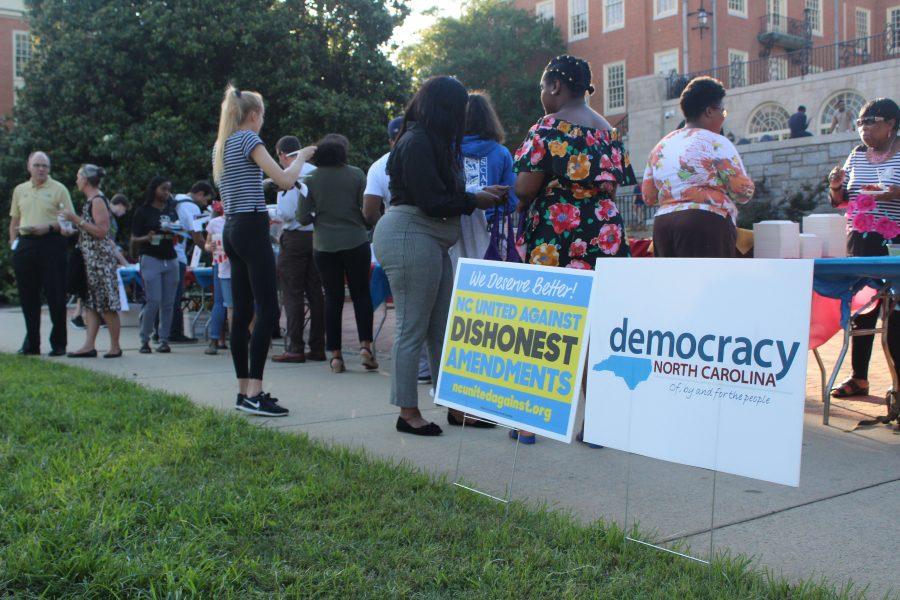Eight weeks before the midterm congressional elections, the American body politic faces the contradictory phenomena of simultaneous political polarization and civic disengagement.
Recent poll data from the Pew Research Center indicates that 71 percent of Republicans and 63 percent of Democrats cite negative views of the opposing party as a major reason to affiliate with their own party. Americans on opposite sides of the political spectrum also find it increasingly difficult to talk to one another or find common ground — for example, 81 percent of Republicans and 76 percent of Democrats report that they cannot agree on basic facts.
At the same time, political participation is lagging, especially among young people. Only 46 percent of voters aged 18 to 29 cast a ballot in the 2016 election.
In response to both problems, the Pro Humanitate Institute has launched Deacs Decide, a campus-wide political engagement project, in an effort to register students, faculty and staff to vote and to raise awareness about issues at stake in the midterm elections. The nonpartisan initiative aims to encourage students to engage civically at the polls and beyond and to interact with ideas different than their own.
“[The Pro Humanitate Institute] has a long history of engaging the campus and local community during national elections,” said Assistant Dean of Students and Pro Humanitate Institute Executive Director Marianne Magjuka. “Deacs Decide fosters democratic capacities, such as considering complex issues from multiple perspectives, communicating across difference and thinking critically about pressing issues in our community.”
To commence the initiative, on Wednesday, Sep. 12 Deacs Decide held a launch party on Manchester Plaza featuring music from Wake Radio, food, civics trivia and voter registration stations. Campus political organizations from both sides of the aisle and local civic organizations were represented. In addition, Deacs Decide invited every candidate running for local office from both political parties to attend.
Although various political organizations and candidates differed by ideology, all reached a consensus that students’ voices and votes are of critical importance in the upcoming midterm elections.
“Students have so much power that they don’t recognize,” said Linda Sutton of Democracy North Carolina, a nonpartisan organization focused on voting rights. “If they got out and voted they could determine any election.”
While other organizations were there to promote more specific agendas, they underlined the central role of voting rights and voter engagement in making significant policy change possible. Amy Adams, who represented Appalachian Voices, a regional organization advocating against pipelines, mountaintop removal mining and coal ash, said that the status quo in North Carolina legislatures won’t change without greater voter participation.
“We see a pattern of the same folks who don’t expand Medicare and who don’t increase teacher pay,” she said. “They are the same folks who prioritize the economy over the environment. Taking care of the environment is a voter rights issue.”
In addition, whether they are on the ballot for the Forsyth County School Board or the U.S. House of Representatives, candidates in attendance stressed that the issues at stake this midterm election season have a momentous impact specifically on college students and millenials.
“I have seen over my lifetime the failure to address climate problems, stagnating wages and labor losing their jobs,” said John Motsinger, a Democratic candidate for the 31st district of the North Carolina Senate. Motsinger, a member of a local labor union, added, “The simplest way to state it is that I don’t see the issues of the youngest generation represented, and I chose to run as a millenial to address the problems of millennials.”
Although North Carolina Senate candidate Joyce Krawiec is Motsinger’s Republican opponent in the 31st district, she echoed similar sentiments about the importance of youth political participation.
“[Young people’s] voices are loud at protests and rallies, but they don’t vote in the numbers that they should,” she said. “Voting is where they can really make a difference and I would love to have their support.”
Winston-Salem City Councilwoman DD Adams, a Democratic candidate for North Carolina’s fifth district in the U.S. House of Representatives, added that the location where students register to vote matters and that Wake Forest students should consider casting their ballots in Winston-Salem.
“You may come from out of town, but you need to vote where you spend 80 to 90 percent of your time,” she said. “You need to vote in this district so we can change the direction of the country right now.” Adams’ opponent, seven-term incumbent Republican Rep. Virginia Foxx, was invited to the event but did not attend.

Post-launch, Deacs Decide will begin a robust schedule of events leading up to the midterm elections on Nov. 6. On Sep. 18, the group will host a screening of the documentary Capturing the Flag, which discusses voter suppression in North Carolina. The film will be followed by a panel discussion on voting rights and the recent gerrymandering court cases in the state. Panelists will include representatives from Democracy North Carolina, League of Women Voters, Common Cause and National Association for the Advancement of Colored People.
Later, on Sep. 25, Deacs Decide will celebrate National Voter Registration Day with a series of games and prizes as well as a voter registration drive on campus and in the community.
Every event connected to Deacs Decide, including a series of deliberative dialogues about issues connected to the midterm elections, will feature a voter registration table. In addition, the team will facilitate shuttles to the polls for early voting and on Election Day.
















